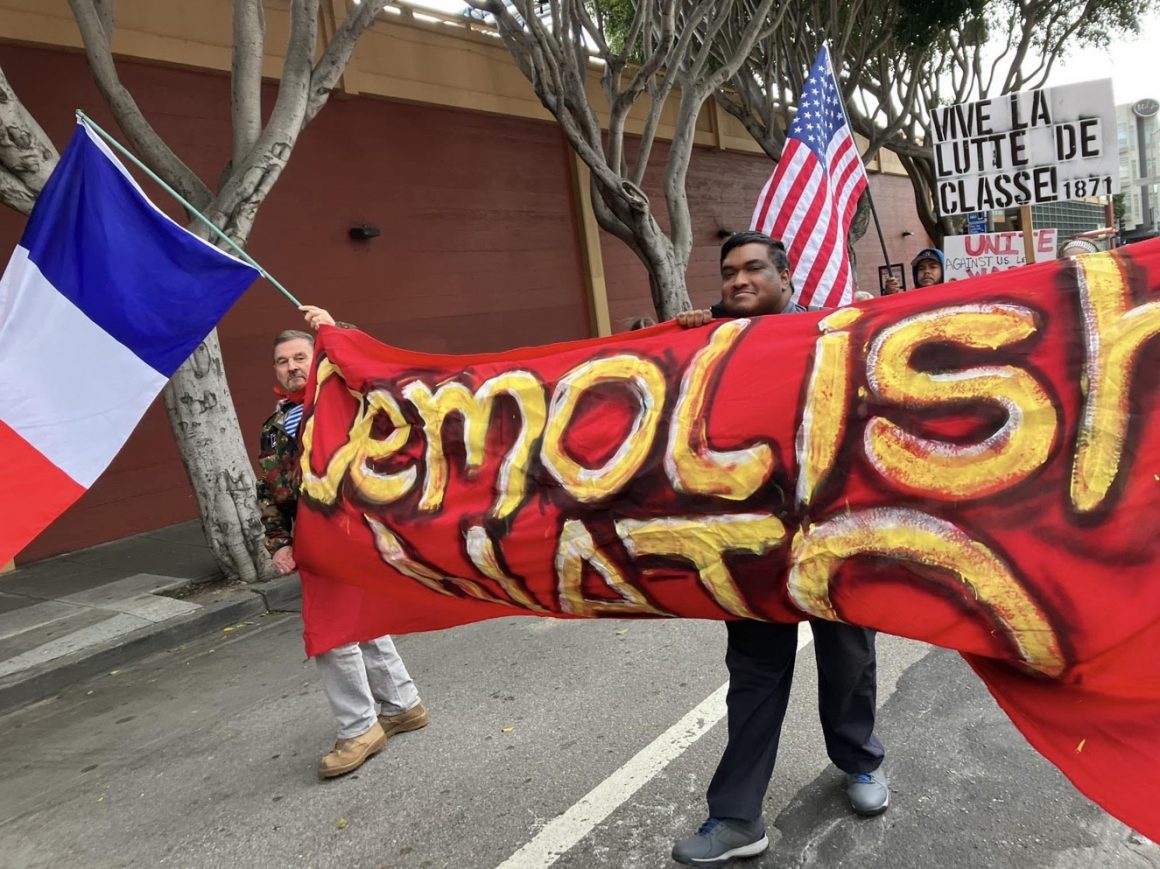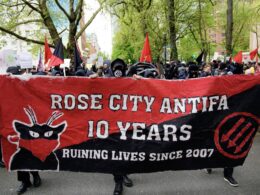How should you judge a people and a society if you’re a Marxist? Not by essentializing them, like ultra-leftists do, but by viewing peoples and societies through a framework of historical development. If a society has had a bourgeois nature at one point in history, that doesn’t mean it still has that nature, or will always have it. And there’s an obvious fallacy in portraying a people as all being of the same class character. Even during the peak of U.S. hegemony, and during the early decades of capitalism on this continent, there were proletarians. And these proletarians were of all colors, as demonstrated by the history of black communists successfully building alliances even with working class whites who were nostalgic for their “southern heritage.” That we can recognize this shared material interest between the country’s workers of all colors doesn’t mean we need to hold on to U.S. patriotism, or act like the United States needs to remain in existence. It simply means that there are many more people in the imperial center who are compatible with revolution than the ultras want us to believe, and that these people have some major material incentives to unify.
The ultras depict a fictitious version of our conditions, a version where much more violence would be needed to attain revolution than would actually be the case. They act like the majority of the people wouldn’t be willing to tolerate a scenario where land jurisdiction gets returned to the tribes, a notion that the reactionaries who oppose rectifying the colonial contradiction ironically also seek to promote. They portray not just the white workers, but the workers even in the most proletarianized groups like the black community, as mostly or entirely labor aristocrats. This is not a materialist way to analyze a society. It’s a way to feel self-superior towards the vast majority of the people around you, and to have an excuse not to engage in class struggle within your own conditions.
Lenin defines labor aristocrats as a “stratum of bourgeoisified workers or ‘labor aristocracy,’ who have become completely petty-bourgeois in their mode of life, in the amount of their earnings, and in their point of view, serve as the main support of the Second International [the reformist socialists – CP] and, in our day, the principal social (not military) support of the bourgeoisie. They are the real agents of the bourgeoisie in the labor movement, the labor lieutenants of the capitalist class, the real carriers of reformism and chauvinism.” If the predominant types of workers in the core were labor aristocrats, why are over 60% of them living paycheck to paycheck? (With the inflation that Biden’s Ukraine proxy war has exacerbated, this has become true, even as the average American worker still makes $45k a year.) And why are only a minority of them solid voters for, or active in, the two dominant bourgeois parties? (Because we all know that part of the reason for the USA’s incredibly low electoral participation rates is that much of the country’s population lacks the class status for elections to be accessible to them, or to feel like elections can change things for them.) When most Americans neither earn enough to make them materially comfortable under capitalism by any reasonable definition; nor lack the points of view that would incentivize them to participate in bourgeois politics; then the labor aristocracy represents a minority of the population.
When the ultras assert or imply that most Americans are labor aristocrats, their arguments don’t rely on the notion that most Americans are prosperous at this stage of our neoliberal rise in inequality. That argument would be too easy to debunk. Instead they tend to appeal to a crude sense of moralism, where their audience is encouraged to feel self-righteous and contemptuous towards the American masses based on a visceral kind of resentment. The true basis for their assertion about Americans lacking revolutionary potential is that because the country’s workers benefit from imperialist extraction in certain ways, these workers have an incurable lack of solidarity with the globe’s workers. That because the people of the United States are and have been complicit in their government’s crimes, we may as well consider the American people synonymous with their government.
It’s easy to see how this kind of thinking is the opposite of helpful. When you discard an entire country’s working class because they have contradictions, you’re showing you don’t care about winning against the bourgeoisie. Only about being right, or at least “right” in your own mind. No revolution can win when those who are supposed to be leading it view virtually everyone within their conditions as enemies. The logical conclusion of this mentality in regards to the imperial center is ironically a highly chauvinistic one. It’s a mentality that encourages Marxists in the U.S. to refrain from engaging in class struggle, and expect revolution to be exported into the core from the neo-colonies. In other words, to refuse to fight against their own government’s imperialist acts, and foist all the responsibility for fighting this government onto the same peripheral peoples whose exploitation these ultra-left “Marxists” benefit from. They’re using the fact that they have contradictions as a rationale for inaction, for viewing their own participation in the liberation struggle as pointless. John Brown, the white resistor of American slavery, wouldn’t be proud of them.
Why are the USA’s workers capable of gaining solidarity with the globe’s workers? Because upon being exposed to revolutionary perspectives, it’s easy for them to come to recognize they have a shared interest with these workers in the transformation of what we now call the “United States” into a socialist society. Into a society that no longer robs the formerly colonized world.
If this weren’t true, and most Americans were cursed to reject revolutionary consciousness forever, why is there so much evidence so far that U.S. workers are open to gaining anti-imperialist consciousness upon seeing anti-imperialist arguments? Why has willingness to sacrifice American energy abundance and incomes to support the Ukraine war effort dropped among Democrats, Republicans, and independents alike throughout the last half year or so? Why has this widespread dissatisfaction with the ways militarism harms our living standards translated into the spontaneous emergence of an anti-NATO movement? The only thing preventing the further rise of this movement, and thereby the infusion of the country’s labor movement with an anti-imperialist synthesis, is the Democratic Party’s monopoly over organizing spaces.
This monopoly isn’t the fault of the people, it’s the fault of “the left” as we’ve come to know it. Revolutionary politics has been kept out of the mainstream for so many decades because those who are supposed to represent the class struggle have been cowardly, deciding again and again to compromise on anti-imperialism. As well as to default to the New Left’s liberal “critical theories” which minimize class. These are the theories that let ultras and radical liberals rationalize not viewing the participants in the anti-NATO movement as truly revolutionary, based on the Russiagate-informed idea that being pro-Russian is reactionary. When somebody is informed by these “radical” ideas that are designed to blunt the class struggle, they’ll even reject demonstrable evidence that the people are coming to revolutionary consciousness, vilifying the workers for coming to anti-imperialist ideas.
The idea that the people are terminally incompatible with revolution is among these imperialism-compatible, pseudo-liberation theories. It can only gain perceived credibility among some because it presents itself as radical. With this illusion’s persuasive aspect being that such theory recognizes the realities of imperialism and settler-colonialism, and therefore is the most “radical” set of ideas.
To these ultras who reject doing the work for class struggle on the basis of its supposed futility in the core, serious Marxists can reply: you know that imperialism and settler-colonialism exist, so what? How does the mere awareness of these things qualify somebody to conclude that the people are fundamentally reactionary? Just because somebody has gone down the academic pipeline to be able to articulate these theories about structural inequality, or has absorbed the rhetoric from online thought leaders who’ve gone down this pipeline, doesn’t mean their perspective is worth taking seriously. If somebody is arguing against engaging in the class struggle, we shouldn’t as much as entertain them. We should struggle against their ideas where appropriate, and continue with our revolutionary work.
————————————————————————
If you appreciate my work, I hope you become a one-time or regular donor to my Patreon account. Like most of us, I’m feeling the economic pinch during late-stage capitalism, and I need money to keep fighting for a new system that works for all of us. Go to my Patreon here.








